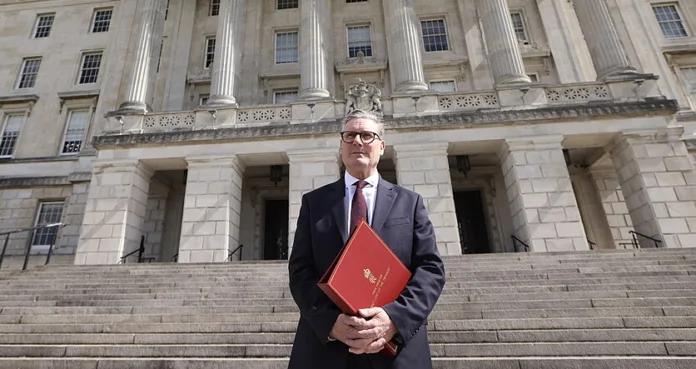As the UK’s economic challenges mount, Starmer and Reeves face mounting pressure over their plan
As economic pressures intensify, Sir Keir Starmer and Rachel Reeves, the faces of Labour’s future, find themselves steering a ship through turbulent waters. With a stuttering economy, skyrocketing government borrowing costs, and falling approval ratings, the duo is under increasing scrutiny.
Starmer and Reeves were once seen as the perfect pair to lead Labour’s return to power, especially with their focus on being trusted on the economy. However, the latest signals from the markets are far from reassuring. This is a pivotal moment for the Labour government as economic uncertainty breeds a precarious political environment.
The current economic backdrop is a tough one. Critics argue that government policies, particularly those from Labour, have exacerbated the stagnating economy. Some within the party are beginning to voice concerns, fearing that their promises might soon outstrip the available resources. Labour MPs have expressed unease about the dwindling funds to support their priorities, especially as government borrowing continues to rise, complicating the party’s fiscal outlook.
The challenges are becoming more pronounced with each passing day. Labour’s position is under constant question, and the media has been quick to scrutinise Starmer’s faith in his chancellor, especially as market sentiments appear lukewarm. A tense exchange recently highlighted these concerns, with reporters questioning whether Starmer had full confidence in Reeves. Despite the tension, Downing Street has since reassured the public that Reeves will remain in her post throughout the parliament, a decision reflecting the deep political ties between Starmer and Reeves.
The real challenge, however, lies in navigating the labyrinth of fiscal constraints. Starmer’s government remains committed to fiscal rules that limit borrowing, emphasising credibility with the markets. This, however, clashes with the need to deliver on Labour’s promises. The reality is simple: without cutting spending, the cost of government borrowing could quickly spiral out of control. Hence, Labour’s big ideas may have to be pared back, forcing difficult choices between political ambition and fiscal responsibility.
Embed from Getty ImagesIn an attempt to shift the narrative, Starmer has increasingly championed the potential of artificial intelligence (AI), positioning it as the future saviour of the UK economy. With AI set to revolutionise productivity and public services, Starmer is eager to highlight the opportunities rather than the risks. His positive rhetoric is an attempt to uplift the public mood, offering hope for growth in an otherwise bleak economic landscape. But even in his optimism, Starmer cannot ignore the reality: not everyone will benefit equally from this technological revolution.
AI promises to boost productivity, but it also risks leaving people behind. As the industrial revolution before it, this new wave of innovation will reshape the economy – with both winners and losers. Starmer’s challenge will be to balance the benefits of AI with the needs of those who might fall through the cracks.
At present, however, it is the economic flatlining that is dominating the political conversation. Navigating these bumpy economic times will test not just Labour’s political will but also the broader stability of the UK’s financial future. The pressure is mounting, and the next steps could determine whether Labour’s plan will sink or soar.
THE GUARDIAN
Keir Starmer has backed Chancellor Rachel Reeves, affirming she will remain in her role until the next general election despite economic difficulties. Reeves faces scrutiny after rising government borrowing costs and a weakening pound. Starmer defended her tough stance on public spending, saying it was essential to meet fiscal rules.
To balance the books, the Treasury seeks billions in savings from departmental budgets ahead of the summer spending review. Starmer stressed Reeves was right to push for fiscal discipline, with the government committed to being “ruthless” in its approach.
A recent YouGov poll shows Reform UK closing the gap on Labour, with the Tories in third place. In response, the Treasury plans significant reforms, including potential cuts to the £300bn welfare budget and changes to work capability assessments, aiming to save £3bn and improve long-term economic stability.
THE STANDARD
Keir Starmer has given Chancellor Rachel Reeves his full support amid growing economic challenges. The pound dropped further against the dollar, while British 30-year government bond yields surged to a 27-year high, exacerbating concerns about the UK economy. Despite these setbacks, Starmer confirmed that Reeves would remain in her role until the next general election, after initially being cautious about her long-term future.
Government borrowing costs are rising, partly due to fears over increased debt issuance amidst a slowing economy and inflationary pressures in the US. Experts also warn that mortgage rates could rise as a result. Reeves, who recently returned from a trip to China aimed at boosting UK growth, continues to face mounting pressure but has received strong backing from her party leader. Downing Street reiterated that she would serve throughout this Parliament.
